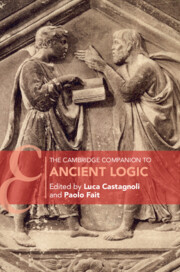
-
Select format
-
- Publisher:
- Cambridge University Press
- Publication date:
- April 2023
- March 2023
- ISBN:
- 9781107477674
- 9781107062948
- 9781107656772
- Dimensions:
- (228 x 152 mm)
- Weight & Pages:
- 0.83kg, 444 Pages
- Dimensions:
- (228 x 152 mm)
- Weight & Pages:
- 0.64kg, 320 Pages
You may already have access via personal or institutional login
Book description
This Companion provides a comprehensive guide to ancient logic. The first part charts its chronological development, focussing especially on the Greek tradition, and discusses its two main systems: Aristotle's logic of terms and the Stoic logic of propositions. The second part explores the key concepts at the heart of the ancient logical systems: truth, definition, terms, propositions, syllogisms, demonstrations, modality and fallacy. The systematic discussion of these concepts allows the reader to engage with some specific logical and exegetical issues and to appreciate their transformations across different philosophical traditions. The intersections between logic, mathematics and rhetoric are also explored. The third part of the volume discusses the reception and influence of ancient logic in the history of philosophy and its significance for philosophy in our own times. Comprehensive coverage, chapters by leading international scholars and a critical overview of the recent literature in the field will make this volume essential for students and scholars of ancient logic.
Reviews
‘The contributions contained in the three parts of the volume each provide a self-contained presentation of the topic they deal with. As a whole, the contributions in the volume provide a coherent overview of the historical development, thematic focuses and subsequent receptions of ancient Greek logic. The authors demonstrate their excellent knowledge of the respective source material and their ability to provide a correct historical and theoretical assessment and classification without speculation.’
Werner Stelzner Source: N.T.M
‘… this book as whole is a testament to the fact that scholarship on ancient Greek logic is a live and accomplished branch of the history of philosophy. If, as the late John Woods suggests in the conclusion of his paper … the great works of Greek logic are like the edifices of classical antiquity, whose “beauty and importance” is not diminished by the fact that they are “no longer in service”, then the Companion will serve as an apt guide to these splendid ruins.’
Ian J. Campbell Source: Bryn Mawr Classical Review
Contents
Metrics
Altmetric attention score
Full text views
Full text views help Loading metrics...
Loading metrics...
* Views captured on Cambridge Core between #date#. This data will be updated every 24 hours.
Usage data cannot currently be displayed.
Accessibility standard: Unknown
Why this information is here
This section outlines the accessibility features of this content - including support for screen readers, full keyboard navigation and high-contrast display options. This may not be relevant for you.
Accessibility Information
Accessibility compliance for the PDF of this book is currently unknown and may be updated in the future.


